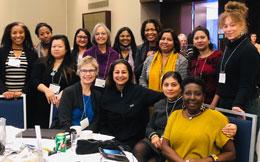“Building a better, safer BC for everyone”

By Mata Press
Born in India and raised in Victoria, Ninu Kang’s life is propelled by pride and prejudice.
The former, imbued with values of equality has been the fuel to overcome the latter by turning obstacles into opportunities.
Today as one of the most recognizable faces in Canada when it comes to issues relating to refugee resettlement and advocating for women’s rights, Kang is again reaching into her past to chart a new chapter.
After almost three decades helping lead a small army of 300 staff, 450 volunteers and 300 contractors at MOSAIC, one of the largest settlement non-profit organizations in Canada, Kang is taking the helm at the Ending Violence Association of British Columbia (EVA BC), which works with over 300 community-based services and initiatives supporting survivors of sexual assault, relationship violence, child abuse and criminal harassment.
"I am grateful to MOSAIC which provided me with many opportunities to learn and grow from direct service to senior leadership roles while working alongside ethnic community leaders, partner organizations and policymakers to advance justice, equity, diversity and inclusion,” Kang told Mata Press Service.
"After spending more than half of my life working at MOSAIC and joining EVA BC, I hope and aspire to utilize my skills to advance the work of anti-racism as it intersects with work of gender-based violence.
“I loved the fact that the organization provides space – it has for me and everyone to be exactly who we are and value our strengths, and help elevate each other in those moments when we need each other.”
Kang’s father moved to Canada in 1972 from India and the family followed two years later to set up their new home in Victoria.
It was not a very welcoming environment then especially for a family with limited English conversational skills.
“I had to excel in something to be accepted as an equal…I started playing field hockey, basketball, volleyball and other sports. All of that opened a way for me to integrate fully into the student body,” said Kang.
After high school, Kang enrolled in the University of Victoria finishing with a BA (economics) in 1988.
It was here, the seeds of her career in advocacy and social justice began to root.
Kang led UVIC’s Economic Students Association and founded the first India Friendship Society. She hosted the first weekly Punjabi/Hindi radio program at the university radio station to connect the South Asian community with university life.
“At university, I become aware of the many issues impacting the South Asian community, particularly newcomers to Canada. I felt I could make a difference in the life of the community and the country if I worked on issues that affect people when they first come to Canada,” she said.
That led Kang to MOSAIC in 1991.
“For the past 30 years, I have had the opportunity to work with newcomers settling in Canada from all parts of the world while assisting them to make their transition as smooth as possible.
“As a South Asian woman, I have observed many gender inequities in my own extended family and I used my experience to learn more from women I work with to make sure that all of our stories don't get lost in the mainstream discourse of the women’s movement. I went back to university to enroll in a MA program in Counselling Psychology as I continued to run an education treatment program at MOSAIC for South Asian men who had used violence in their intimate relationship.
“I have worked behind closed doors in counselling sessions with women, listening to their stories of abuse, violence and helplessness. I have also seen men cry in group counselling sessions realizing the horror of their own conduct towards their female partner. I understand the importance of men and women having secure and safe spaces to express themselves as they try to overcome the effects of abuse and violence,” said Kang
As the Director of Communications and Development, Kang also led MOSAIC in developing a response plan to address the resettlement of Syrian refugees in BC.
In the community, Kang’s commitment to social justice led her to be one of the founding members of the Punjabi Women’s Association along with many other community groups and coalitions, including the South Asian Community Coalition Against Youth Violence (SACCAYV).
For her tireless advocacy, Kang has been awarded honours by the RCMP, recognized as one of 150 women in Canada to advance gender equity by the Minister of the Status of Women Canada. In 2018, she received the Nehru Humanitarian award.
MOSAIC CEO Olga Stachova said: “I want to thank Ninu for her long-term commitment and dedication to MOSAIC and for amplifying MOSAIC’s message and promoting MOSAIC’s services. Ninu has been an active member of the Executive Leadership Team and an instrumental part of MOSAIC’s success and recognition. We wish her well in her new role.”
Premier John Horgan took to Twitter to thank Kang for her “leadership and continued work to build a better, safer province for everyone.”
One of Kang’s immediate priorities as associate executive director at EVA BC will be to help oversee a new $10-million grant program to support the delivery of co-ordinated emergency sexual assault response services in regions throughout B.C.
This grant program will help organizations deliver community-based emergency sexual assault response services that are trauma-informed and culturally appropriate. The services will meet the needs of sexual assault survivors around the province, including the unique needs of Indigenous communities and survivors.






